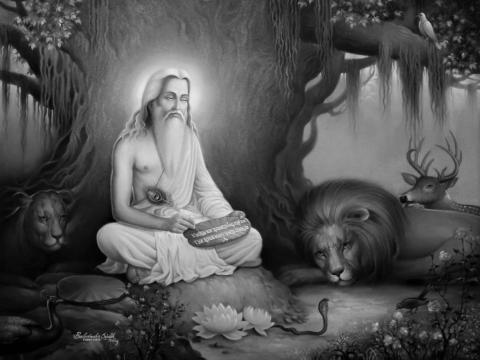
Bhāravi further refers to speech in the conversation between Indra and Arjuna:
प्रसादरम्यमोजस्वि गरीयो लाघवान्वितम्।
साकाङ्क्षमनुपस्कारं विष्वग्गति निराकुलम्॥
न्यायनिर्णीतसारत्वान्निरपेक्षमिवागमे।
अप्रकम्प्यतयान्येषामाम्नायवचनोपमम्॥
अलङ्घ्यत्वाज्जनैरन्यैः क्षुभितोदन्वदूर्जितम्।
औदार्यादर्थसम्पत्तेः शान्तं चित्तमृषेरिव॥ (11.38–40)
“Your speech is unambiguous, charming and resplendent. It is concise and yet...

After Kālidāsa, Bhāravi is perhaps the only poet who steered the ship of Sanskrit narrative poetry along a new route. Successive poets merely followed his lead. Known for investing words with profound meaning, Bhāravi has given some remarkable insights into poetics in his work, Kirātārjunīyam. Unsurprisingly, these insights mainly relate to the clarity and gravitas of poetic content. Let us examine this in some detail.
Yudhiṣṭhira allays Bhīma’s...

Mallinātha has made some insightful observations in commenting on this verse. According to him, there were pictures in the mansion of various episodes from the time that Rāma and Sītā spent in the forest. Among them were paintings that depicted Sītā’s abduction, Rāma’s lament, his search for Sītā, and so on. When Rāma and Sītā looked at these and mulled over the episodes once again, they were neither sad nor disturbed; instead, they were happy...

The first relates to the word sampṛktau. The poet has preferred the rather rare word sampṛkti to the more common saṃyukti. Let us understand the nuances of these words. Sampṛkti is derived from the verbal root ‘pṛcī–samparke.’ It means union, mutuality and parity. On the other hand, the word saṃyukti simply means a merger or combination. The first evokes a feeling of compatibility and complementariness. The second does not. The union of sound...

Über-human and sub-human characters do not produce rasa unless they are ‘humanized’ – this is a fundamental tenet of aesthetics. A great poet knows from experience that his work will gain depth only when the characters pass through various trials involving basic human feelings such as love, fury and hatred. Vālmīki and Vyāsa, Kālidāsa’s predecessors, have portrayed their protagonists as human beings through and through. They have succeeded not...

Let us proceed to the sixth act of Abhijñānaśākuntala. Duṣyanta has made a painting of Śakuntalā. The vidūṣaka takes one look at it and exclaims: “Madhurāvasthāna-darśanīyo bhāvānupraveśaḥ,” “You have sketched her posture so charmingly that real emotions seem to enter the painting!” (Loose translation.) These words are of supreme significance to aesthetics. Duṣyanta’s brimming love for Śakuntalā has been reflected in the painting and has made it...

Abhijñānaśākuntala is one of the ripest fruits of Kālidāsa’s mature genius. The poet makes a candid confession in the prologue of this play:
आ परितोषाद्विदुषां
न साधु मन्ये प्रयोगविज्ञानम् ।
बलवदपि शिक्षिताना-
मात्मन्यप्रत्ययं चेतः॥ (१.२)
I cannot be convinced of my skills as a dramatist until discerning spectators are satisfied. Even well-trained people are beset by self-doubt.
In seeking the satisfaction of his...

Kauśikī’s words of praise upon seeing Mālavikā perform are noteworthy. Her response is in the form of a verse, whose second half provides incredible insights into all major forms of art including poetry. She says: bhāvo bhāvaṃ nudati viṣayād rāgabandhaḥ sa eva (2.8). It roughly means: “One emotion inspires the next, covering the whole range of feelings. This is how a passionate recital looks like!” We can broadly relate this to literary...

Unless poetry caters to people with varying tastes, it will not find a strong footing. It naturally follows that the poet should know the ways of the world well. He should be capable of portraying its various dimensions in subtle and intricate ways as the occa-sion demands. Now the question arises: How does a poet acquire this ability? By gaining an insight into the forces that propel the activities of the world—the three guṇas—sattva, rajas and...

Let us have a look at the dialogues before and after this verse. A minor character expresses concern that Kālidāsa might lose face if his play is performed disregarding the compositions of past masters. The stage-director uses the phrase viveka-viśrānta in his dialogue. The minor character listens to the verse, acquiesces, and says āryamiśrāḥ pramāṇam.
While the poet initially engages the stage-director to argue his case, he soon comes to a...
